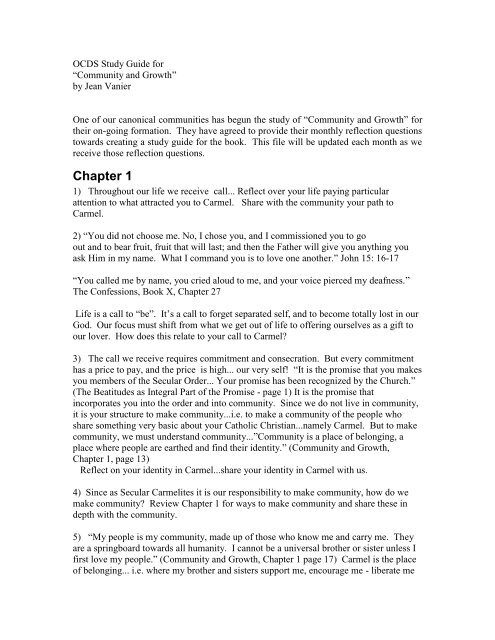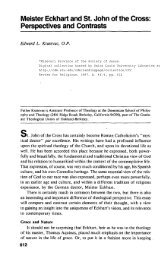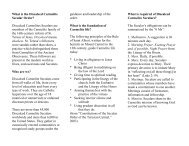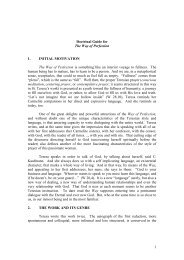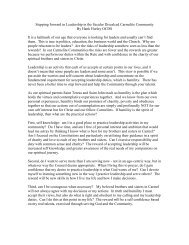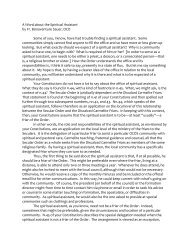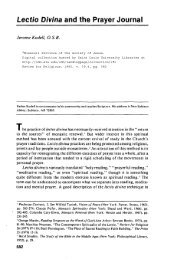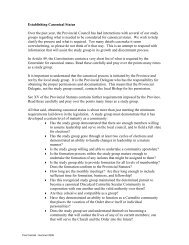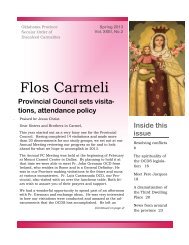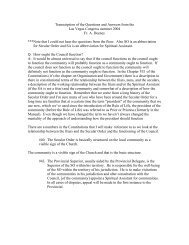OCDS Study Guide for - Secular Carmelites of the Province of St ...
OCDS Study Guide for - Secular Carmelites of the Province of St ...
OCDS Study Guide for - Secular Carmelites of the Province of St ...
You also want an ePaper? Increase the reach of your titles
YUMPU automatically turns print PDFs into web optimized ePapers that Google loves.
On p. 133 Vanier states: “Growth in love is a growth in <strong>the</strong> Spirit. The stages throughwhich we must pass in order to grow in love are <strong>the</strong> stages through which we must passto become more totally united to God…. But true growth comes from God, when we cryout to Him from <strong>the</strong> depths <strong>of</strong> <strong>the</strong> abyss to let his Spirit penetrate us.” What are <strong>the</strong>similarities between <strong>the</strong> stages <strong>the</strong> soul passes through toward union with God and<strong>the</strong> stages a Community passes through?A new- found relationship with God brings with it a great enthusiasm and easy ability tosacrifice. The heart is enflamed as God holds our soul as an infant in its mo<strong>the</strong>r’s arms.As Vanier points out on p. 122, “People can generally only become conscious <strong>of</strong> <strong>the</strong>irlimitation if at <strong>the</strong> same time <strong>the</strong>y are given <strong>the</strong> strength to overcome <strong>the</strong>se by beinghelped to discover <strong>the</strong>ir own capacities <strong>for</strong> love, goodness and positive action, and toregain confidence in <strong>the</strong>mselves and <strong>the</strong> Holy Spirit. People cannot accept <strong>the</strong>ir ownfears if <strong>the</strong>y do not at <strong>the</strong> same time feel loved, respected and trusted. They cannotovercome <strong>the</strong>ir difficulties and inner darkness if <strong>the</strong>y have not been helped to discoverthat <strong>the</strong>y are lovable.”In <strong>the</strong> section on Tensions and Anguish, Vanier states that growth is impossible withouttension, without suffering. God’s light and truth penetrate <strong>the</strong> soul and cause it anguish.P. 131: when we are at peace, when we have accepted our own deep wounds andweaknesses, when we are in touch with our heart and our capacity <strong>for</strong> tenderness, <strong>the</strong>nour actions flow from our true selves and become a source <strong>of</strong> growth.2. Our relationship with o<strong>the</strong>rs. As pr<strong>of</strong>essed members, we made a promise tolive according to <strong>the</strong> beatitudes and <strong>the</strong> Gospel <strong>of</strong> Jesus Christ. How doesour relationship with o<strong>the</strong>rs act as a barometer <strong>for</strong> our Carmelite vocation?On p. 134 Vanier draws from <strong>St</strong>. Paul’s letter to <strong>the</strong> Corinthians (ch. 13) and his letter to<strong>the</strong> Galatians (ch. 5) to describe <strong>the</strong> measures <strong>of</strong> love: “Love is being patient, renderingservice, not being jealous or proud, not bragging all <strong>the</strong> time about oneself andexaggerating one’s own qualities. Love is doing nothing which bruises o<strong>the</strong>rs; it isputting <strong>the</strong> interests <strong>of</strong> o<strong>the</strong>rs above our own. It is not being irritable, bitter, aggressive,or searching <strong>for</strong> <strong>the</strong> evil in o<strong>the</strong>rs; it is not rejoicing in injustice but seeking <strong>the</strong> truth inall things….growth in love is growth in joy and patience, goodness, generosity, fidelity,tenderness and self-control. It is <strong>the</strong> opposite <strong>of</strong> all our tendencies to division – hatred,quarrelling, jealousy, rage, disputes, dissension, schism, desire and <strong>of</strong> all those darktendencies which lead us to <strong>for</strong>nication, impurity, debauchery, idolatry, witchcraft, orgiesand gluttony…. Perhaps <strong>the</strong> essential quality <strong>for</strong> anyone who lives in community ispatience.”On p. 136 Vanier says we all live more or less on illusions which protect ourvulnerability. On p. 140 he states, “We all carry our own deep wound, which is <strong>the</strong>wound <strong>of</strong> our loneliness.” He goes on to say, “We have to realise that this wound isinherent in <strong>the</strong> human condition and that what we have to do is to walk with it instead <strong>of</strong>fleeing from it. We cannot accept it until we discover that we are loved by God just as weare, and that <strong>the</strong> Holy Spirit, in a mysterious way, is living at <strong>the</strong> center <strong>of</strong> <strong>the</strong> wound.”In order to lose our illusion about ourselves, we need relationship with o<strong>the</strong>rs. Childrenare very good at mirroring truth to us.3. The <strong>OCDS</strong> Community to which you made your promise. What stage <strong>of</strong> growthis it in? Why? How does it relate to <strong>the</strong> whole Carmelite Community?
See pages 149-152. Vanier states, “But when a community has enough members to doall <strong>the</strong> work, when it has enough material goods, it can relax. It has strong structures. Itis fairly secure. It’s <strong>the</strong>n that <strong>the</strong>re is danger!”4. What is <strong>the</strong> role <strong>of</strong> Carmel in <strong>the</strong> Church? How do we fit into this widerCommunity?See pp. 149 and beyond to end <strong>of</strong> Chapter 4. On p. 150 Vanier states, “Each communitymust recognize its own focus <strong>of</strong> fidelity, its own essential vision. If it loses sight <strong>of</strong> thisfocal point, it will regress, because <strong>the</strong> foundation on which it was built has crumbled.”What is <strong>the</strong> essential vision <strong>of</strong> Carmel? Has it maintained <strong>the</strong> spirit <strong>of</strong> its originalfounders, <strong>St</strong>. Teresa <strong>of</strong> Avila and <strong>St</strong>. John <strong>of</strong> <strong>the</strong> Cross? Do you view contemplativeprayer itself as an apostolate?On p. 155 Vanier says, “Men and women <strong>of</strong> prayer, hidden in monasteries andhermitages, sometimes living in great pain, are like hidden pumps irrigating dry land.”And on p. 156, “There is a mystery in <strong>the</strong> secret strength <strong>of</strong> those whose bodies arebroken, who seem to do nothing all day, but who remain in <strong>the</strong> presence <strong>of</strong> God. Theirimmobility obliges <strong>the</strong>m to keep <strong>the</strong>ir minds and hearts fixed on <strong>the</strong> essential, on <strong>the</strong>source <strong>of</strong> life itself. Their suffering and agony bears fruit; <strong>the</strong>y give life.”Chapter 5A community reflects <strong>the</strong> people who make it up. It has energy founded on hope, but<strong>the</strong>re is also weariness, a search <strong>for</strong> security and a fear <strong>of</strong> evolving toward maturity <strong>of</strong>love and responsibility: it <strong>of</strong>ten reflects our fear <strong>of</strong> dying to our personalinstincts…people and community needs nourishment in order to live <strong>the</strong> values <strong>of</strong> <strong>the</strong>gospel.Q1. as members <strong>of</strong> <strong>OCDS</strong>, are we able to die to our personal instincts…are able topractice detachment <strong>for</strong> self-knowledge that benefits <strong>the</strong> community?Q2. how is one nourished in community? Is it in <strong>the</strong> life <strong>of</strong> <strong>the</strong> Spirit, that gives energyto self and community, or is it <strong>for</strong> a personal agenda, e.g. just <strong>for</strong> self spiritual growth andpractice.Communities need wisdom to discern <strong>the</strong> nourishment <strong>the</strong>y need in order to become trulyalive in <strong>the</strong> Spirit. Because <strong>of</strong> our personal richness and complexity, we all needdifferent kinds <strong>of</strong> nourishment. We are nourished by our encounter with God and o<strong>the</strong>rsexpressly in community.In any case, we need to go beyond our own resources, get out <strong>of</strong> our own box and lookout toward community.Q3. What gifts, that I have, am I sharing in community to fur<strong>the</strong>r <strong>the</strong> Spirit? Or am I justsitting back letting o<strong>the</strong>rs contribute to and fur<strong>the</strong>r <strong>the</strong> Carmelite spirit in community life.Have I entered into <strong>the</strong> collective conscience <strong>of</strong> <strong>the</strong> <strong>OCDS</strong> community by surrenderingmy own gift and put it decisively at <strong>the</strong> community’s service?Q4. Am I discerning my place on Carmelite spirituality in <strong>the</strong> spirit <strong>of</strong> detachment (Q1)?How is this discernment aiding <strong>the</strong> community?Vanier writes that we need “daily manna” in order to maintain fidelity to our covenant, inour case, fidelity to <strong>the</strong> daily round <strong>of</strong> <strong>the</strong> Carmelite vocation, even though <strong>the</strong>y may be“small things.” (Ex. <strong>St</strong>. Therese <strong>of</strong> Lisieux and Bro. Lawrence). This is in our daily lifewherein we can discover in a present moment <strong>the</strong> presence <strong>of</strong> God in small things.
Q5. In imitation <strong>of</strong> our saints above, how do I manage <strong>the</strong> small things as moments inGod’s presence?Q6. Do I recognize moments <strong>of</strong> grace in community that perhaps renew our hearts andgive us peace?We must be attentive to <strong>the</strong>se moments <strong>of</strong> peace which renew us and create in us a desireto be close to Jesus and to those I community, which call us to greater fidelity. We mustbe attentive to o<strong>the</strong>rs, to notice in <strong>the</strong>m <strong>the</strong> presence <strong>of</strong> <strong>the</strong> Holy Spirit.Q7. How am I doing in my attention to o<strong>the</strong>rs in this regard in my community and in <strong>the</strong>larger Carmelite community? How do I see <strong>the</strong> Spirit at work in community?Q8. Do I feel a responsibility <strong>for</strong> <strong>the</strong> atmosphere <strong>of</strong> <strong>the</strong> community with my trust andlove, or do I present sadness and all sorts <strong>of</strong> criticism?People need an intellectual understanding <strong>of</strong> <strong>the</strong> significance <strong>of</strong> <strong>the</strong>ir community. Theyneed a clear reminder <strong>of</strong> <strong>the</strong> meaning and place <strong>of</strong> <strong>the</strong> community in today’s world and Ihistory <strong>of</strong> salvation.Q9. Does your community provide such understanding and meaning? How? If not, <strong>the</strong>nhow could <strong>OCDS</strong> provide understanding and meaning?Intellectual discipline is important <strong>for</strong> human growth and earthing in community life.Q10. Has one’s community provided <strong>for</strong>mation/on-going-<strong>for</strong>mation help to reflect and tobe grounded more deeply in <strong>the</strong> certitudes <strong>of</strong> faith and human thought?Q11.As a part <strong>of</strong> intellectual discipline, how am I doing about studying and applying <strong>the</strong><strong>OCDS</strong> Constitution and local statutes in my <strong>OCDS</strong> experience when possible?We all have to find our own rhythm <strong>of</strong> prayer. Times <strong>of</strong> solitude do not separate me fromo<strong>the</strong>rs; it helps me to love <strong>the</strong>m more tenderly, realistically and attentively. I find mytrue-self in solitude realistically in relation with o<strong>the</strong>rs. To grow in human ways and innerfreedom, we need both sharing and communal prayer, and solitude, reflection,inwardness, and personal prayer.Q12. Does <strong>the</strong> Carmelite tradition <strong>of</strong> prayer and discipline suggested in its rules provideguidelines <strong>for</strong> pursuing <strong>the</strong> means <strong>for</strong> a rhythm <strong>of</strong> prayer?Q13. Should <strong>the</strong>re be prayer experience sharing within <strong>the</strong> community or should this beheld personal?Vanier points to <strong>the</strong> importance if <strong>the</strong> Eucharist in community life.Q14. Should communities celebrate “spiritual communion” in lieu <strong>of</strong> <strong>the</strong> Eucharist?Would this be an acceptable way to be ga<strong>the</strong>red in communion with one ano<strong>the</strong>r <strong>of</strong>fering<strong>the</strong>mselves to <strong>the</strong> Trinity, so tat <strong>the</strong> whole community may be a place <strong>of</strong> <strong>the</strong> presence <strong>of</strong><strong>the</strong> Kingdom on this earth?Chapter 61. How does <strong>the</strong> council <strong>of</strong> my community support and nurture <strong>the</strong> gifts <strong>of</strong> all <strong>the</strong>members <strong>of</strong> <strong>the</strong> community?2. Vanier says that <strong>the</strong> leaders <strong>of</strong> a community are to support <strong>the</strong> growth <strong>of</strong> its members.Art. 46 <strong>of</strong> <strong>the</strong> Constitutions says “The primary responsibility <strong>of</strong> <strong>the</strong> Council is <strong>the</strong><strong>for</strong>mation and Christian and Carmelite maturing <strong>of</strong> <strong>the</strong> members <strong>of</strong> <strong>the</strong> community.”How do <strong>the</strong>se two ideas fit toge<strong>the</strong>r? How does <strong>the</strong> Local Council and o<strong>the</strong>r leadership in
<strong>the</strong> community support <strong>the</strong> growth <strong>of</strong> members in <strong>the</strong> Carmelite charism? Does <strong>the</strong> LocalCouncil approach its duties with this mindset or do <strong>the</strong>y approach <strong>the</strong>m from a moremanipulative, power focused mindset?3. Vanier says that leaders need to organize <strong>the</strong> community, animate it, and love eachperson in it. In order to do so, <strong>the</strong>y need to keep <strong>the</strong> goal or objective <strong>of</strong> <strong>the</strong> communityin mind in order to love it and live it. What is <strong>the</strong> goal <strong>of</strong> Carmelite community? Howdo we keep that as our focus when making community decisions?4. What are my own views <strong>of</strong> authority? How willing am I to serve in a position <strong>of</strong>authority? Do I view positions <strong>of</strong> authority in our community as a way <strong>of</strong> service both to<strong>the</strong> community and to God? How does leadership as service differ from leadership beinga position <strong>of</strong> prestige and advantages? Which <strong>of</strong> those ways <strong>of</strong> viewing leadership do Isee in myself? Which do I see in <strong>the</strong> way my Local Council functions?5. Vanier reminds us that God chose leaders who were broken: Moses, Peter, Paul. Do Isee myself as unworthy <strong>of</strong> being called to leadership or do I recognize that my ownbrokenness might be <strong>the</strong> gift needed to serve <strong>the</strong> community at this time?6. How does <strong>the</strong> Local Council keep <strong>the</strong> community focused on <strong>the</strong> essentials <strong>of</strong>Carmelite life while creating an atmosphere <strong>of</strong> mutual love, confidence, sharing, peaceand joy among <strong>the</strong> members? How do I do both <strong>of</strong> those things?7. At election time, how does my community choose its council? What do I look <strong>for</strong> in acouncil member? Do I vote based on popularity or do I vote based on leadership skills?Do I base my vote on whe<strong>the</strong>r I think a person will serve <strong>the</strong> community well or becauseI am good friends with that person?8. Do I know how to share responsibility with o<strong>the</strong>rs? Or do I step in to do it all myselfbecause its quicker and easier and I might do it better than ano<strong>the</strong>r? How well to <strong>the</strong>members <strong>of</strong> <strong>the</strong> Local Council share responsibility with each o<strong>the</strong>r and with <strong>the</strong> largercommunity? Do <strong>the</strong>y know how to delegate things so as to develop and call upon <strong>the</strong>gifts <strong>of</strong> every member <strong>of</strong> <strong>the</strong> community?9. How well do <strong>the</strong> leaders in <strong>the</strong> community accept <strong>the</strong> vision <strong>of</strong> <strong>the</strong> o<strong>the</strong>r members <strong>of</strong><strong>the</strong> community? Do <strong>the</strong>y reflect community goals or <strong>the</strong>ir own goals? If I am a leader inmy community, who’s goals do I focus on? How willing am I to step down fromauthority when <strong>the</strong> time comes? How willing am I to let go <strong>of</strong> my own goals toimplement to goals <strong>of</strong> <strong>the</strong> community?10. How familiar am I with <strong>the</strong> legislation <strong>of</strong> <strong>the</strong> Order (Rule <strong>of</strong> <strong>St</strong> Albert, Constitutions,Provincial <strong>St</strong>atutes)? Do I regularly review <strong>the</strong>se with an eye towards how well I amliving out <strong>the</strong> commitment which <strong>the</strong> legislation calls me to? Am I familiar enough with<strong>the</strong>m to know where to look <strong>for</strong> guidance when faced with a question <strong>of</strong> community life?Does <strong>the</strong> Local Council regularly refer to <strong>the</strong> <strong>OCDS</strong> legislation when discernmentdecisions related to community life?
11. How well do <strong>the</strong> leaders <strong>of</strong> my community (or myself if I am one <strong>of</strong> those leaders)listen to all <strong>the</strong> members <strong>of</strong> <strong>the</strong> community? How do <strong>the</strong>y seek out <strong>the</strong> input <strong>of</strong> <strong>the</strong>quietest, least vocal <strong>of</strong> <strong>the</strong> members? Do <strong>the</strong>y truly listen to <strong>the</strong> community and are <strong>the</strong>yopen to <strong>the</strong> ideas coming from <strong>the</strong> community or only <strong>the</strong>ir own ideas?12. If I am a leader, who is <strong>the</strong> person that keeps me grounded? Who makes sure I don’tlet things go to my head? Who is my “personal prophet” reminding <strong>of</strong> me what is trulyessential and speaking truth to me that o<strong>the</strong>rs may not want to say?13. How does my community support and <strong>for</strong>m people <strong>for</strong> leadership roles? Do <strong>the</strong>same people keep getting elected to <strong>the</strong> council or is <strong>the</strong>re a sense <strong>of</strong> many in <strong>the</strong>community having <strong>the</strong> gifts needed to serve on council? How do we foster leadershipskills in all our members? Is this included in some way in our <strong>for</strong>mation program?14. What are my own expectations <strong>of</strong> those in leadership? Do I feel free to bring myconcerns to <strong>the</strong>m? Do I remember to feel compassion towards <strong>the</strong>m even when Idisagree with <strong>the</strong>ir decisions? Do I idealize those in leadership or do I recognize that<strong>the</strong>y too have both strengths and weaknesses?15. Read again <strong>the</strong> last article <strong>of</strong> <strong>the</strong> Rule <strong>of</strong> <strong>St</strong> Albert.Chapter 71. Chapter 7 speaks <strong>of</strong> o<strong>the</strong>r gifts in community. As you reflect upon community whatare some important gifts that a community might need to be a healthy community?2. As <strong>Carmelites</strong> we are asked to seek <strong>the</strong> guidance <strong>of</strong> a spiritual director. Why do youthink it is important to get a compatible spiritual guide?3. “Teresa <strong>of</strong> Avila insisted on spiritual guides being truly wise <strong>the</strong>ologians.” Can youshare a time when <strong>the</strong> wisdom <strong>of</strong> a spiritual guide might have helped in a difficultposition in your spiritual life?4. “We have to learn to draw on our sufferings, distress and setbacks so can growspiritually.” How does this fit into <strong>the</strong> Carmelite way <strong>of</strong> life?5. Take a few moments to reflect and share you insights on <strong>the</strong> many gifts <strong>of</strong> <strong>the</strong>community. How do your own personal gifts add to your Carmelite community?This is “so we participate in each o<strong>the</strong>r’s gifts and help each o<strong>the</strong>r build community.”6. How does our Carmelite promise <strong>of</strong> obedience play an active role in our personalcommunities? The idea <strong>of</strong> obedience falls under <strong>the</strong> gift <strong>of</strong> availability.
7. “The most precious gift in community if rooted in weakness. It is when we are frailand poor that we need o<strong>the</strong>rs, that we call <strong>the</strong>m to love and see <strong>the</strong>ir gifts.” Discusswhat this means.8. “It is good to recognize, encourage and affirm gifts.” Take time to go around andaffirm someone in your community. It helps to streng<strong>the</strong>n <strong>the</strong> community.


